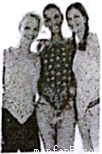赞成 | 反对 |
1.广告能引导人们选择货物; 2.广告能使消费者更好地了解货物和商家; 3……. | 1.经常被虚假广告欺骗; 2.在阅读广告上浪费了大量的时间; 3……. |
你的观点:1……. 2…… | |
注意:1.短文的开头和结尾已给出,但不计入总词数。
2.可适当增加细节,以使行文连贯。
3.词数100左右。
Nowadays, more and more advertisements appear on newspapers, broadcasting, magazines as well as streets. Advertisement is a popular way to communicate with consumers. People have different views on advertisements.
____________________________________________________________________________________________
____________________________________________________________________________________________
____________________________________________________________________________________________
____________________________________________________________________________________________
____________________________________________________________________________________________
___________________________________________________________________
But whether you like it or not, advertisements have become a part of our life.




